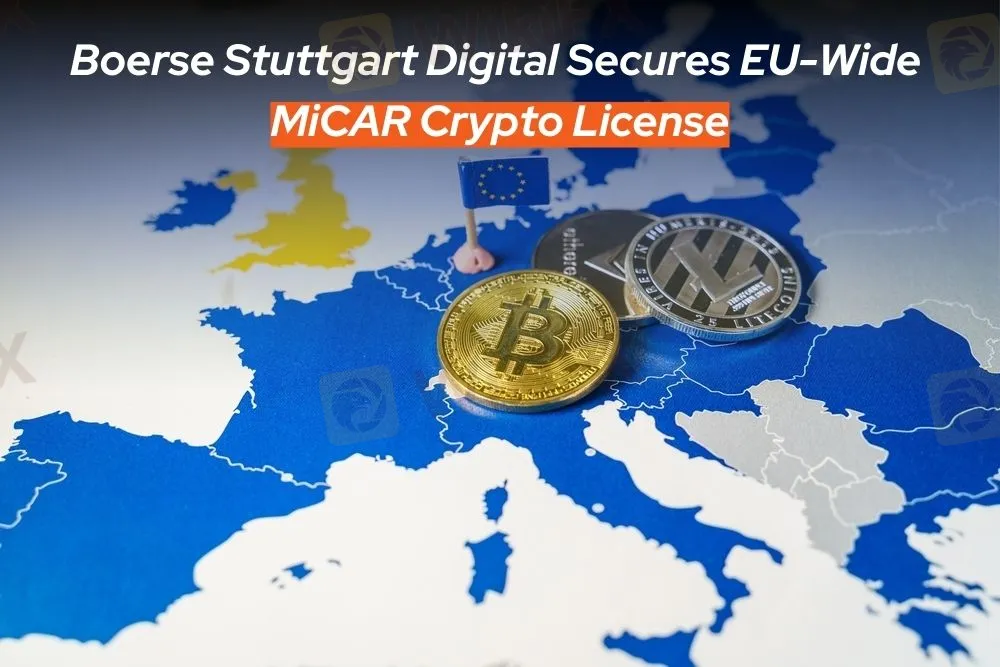简体中文
繁體中文
English
Pусский
日本語
ภาษาไทย
Tiếng Việt
Bahasa Indonesia
Español
हिन्दी
Filippiiniläinen
Français
Deutsch
Português
Türkçe
한국어
العربية
Boerse Stuttgart Digital Secures EU-Wide MiCAR Crypto License
Abstract:Boerse Stuttgart Digital secures Germany’s first MiCA license, enabling EU-wide operations and expanding its digital asset services.

Boerse Stuttgart Digital, a subsidiary of Germany‘s second-largest stock exchange, recently became the first German entity to secure a crypto-asset service provider (CASP) license under the EU’s Markets in Crypto-Assets (MiCA) regulations. This license, awarded by the Federal Financial Supervisory Authority (BaFin), enables Boerse Stuttgart Digital to operate across all EU member states, marking a significant milestone in the companys journey towards digital asset expansion.
Regulatory Challenges and Breakthrough
The implementation of MiCA regulations across the EU aims to create a consistent framework for crypto-asset services. However, Germanys adoption faced delays due to political instability, including the collapse of the coalition government. This left legislative gaps, such as the formal designation of BaFin as the MiCA regulator. Just before the 2024 holiday season, the Bundestag passed the necessary laws, allowing BaFin to issue the CASP license.
Building on Institutional Ties and Expanding Offerings
A key factor in Boerse Stuttgart Digital‘s success is its collaboration with institutional partners like DZ Bank, Germany’s second-largest financial institution. This partnership supports the rollout of crypto services to 737 German community banks, with pilot projects already underway. The companys ability to bridge traditional banking and digital assets showcases its commitment to advancing the financial ecosystem.
According to Dr. Matthias Voelkel, CEO of Boerse Stuttgart Group, the company is working to develop integrated solutions for financial institutions across Europe. By building on its expertise, the firm aims to scale its operations while meeting the growing demand for secure and efficient digital asset services.
Disclaimer:
The views in this article only represent the author's personal views, and do not constitute investment advice on this platform. This platform does not guarantee the accuracy, completeness and timeliness of the information in the article, and will not be liable for any loss caused by the use of or reliance on the information in the article.
Read more

CryptoCurrency Regulations in India 2025 – Key Things You Should Know
Cryptocurrency has become a major trend in today’s world. Crypto Experts believe it’s the future, which is why many people are investing heavily in it. But before jumping in, it’s important for crypto enthusiasts to understand the key rules about cryptocurrency in India.

Global Brokers Vs. Indian Rules: Why They Struggle in India
RBI issued a warning last year against 75 forex brokers. Those brokers are globally popular and regulated in other countries, but they are banned in India. Only few brokers even have physical offices located in India. So, why do global brokers face so many challenges in entering the Indian market?

Tokenized Stocks: Innovation or Just Another Wrapper?
While tokenized stocks promise global, round-the-clock trading, many platforms only offer synthetic exposure similar to CFDs. Without shareholder rights or deep liquidity, their added value remains in question.

Crypto Craze Fizzling Out? Here is Why
The Crypto Craze among users is fading out. The wave of Cryptocurrency has slowed down. But what are the major reasons why this has happened?
WikiFX Broker
Latest News
America's Deficit Reckoning: How the U.S. debt spiral could spark a crisis
Treasury yields hold steady as Trump extends tariff deadline
Gold Prices to Fluctuate This Week Amid July 9 Tariff Deadline, Fed Policy
Goldman Sachs revamps Fed interest rate cut forecast for 2025
Forex Hedging: Is It a Trader’s Safety Net or Just an Illusion?
OPEC+ members agree larger-than-expected oil production hike in August
Top Wall Street analysts are pounding the table on these 3 stocks
Stock futures fall after Trump team says tariffs will go into effect on Aug. 1: Live updates
FCA clarifies expectations on bullying, harassment and violence to deepen trust in financial service
Asia-Pacific markets mixed after Trump shifts goalposts on tariffs again
Currency Calculator


